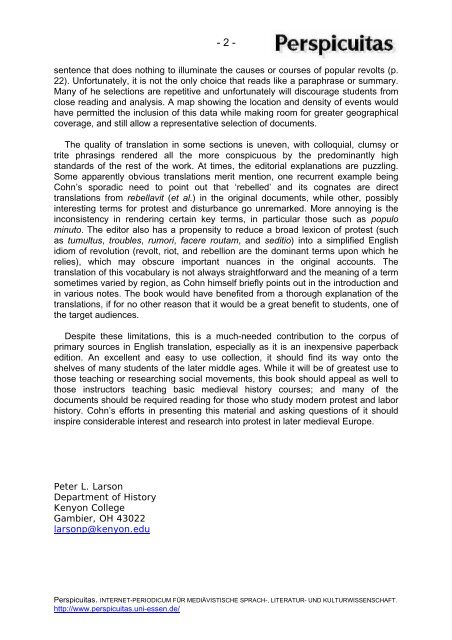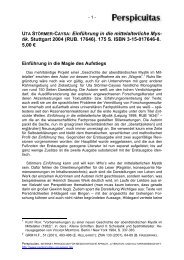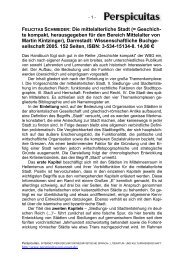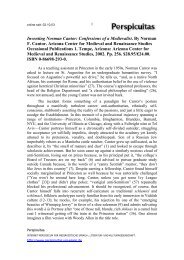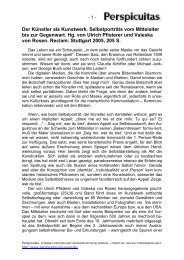Popular Protest in Late Medieval Europe: Italy, France, and Flanders
Popular Protest in Late Medieval Europe: Italy, France, and Flanders
Popular Protest in Late Medieval Europe: Italy, France, and Flanders
Create successful ePaper yourself
Turn your PDF publications into a flip-book with our unique Google optimized e-Paper software.
- 2 -sentence that does noth<strong>in</strong>g to illum<strong>in</strong>ate the causes or courses of popular revolts (p.22). Unfortunately, it is not the only choice that reads like a paraphrase or summary.Many of he selections are repetitive <strong>and</strong> unfortunately will discourage students fromclose read<strong>in</strong>g <strong>and</strong> analysis. A map show<strong>in</strong>g the location <strong>and</strong> density of events wouldhave permitted the <strong>in</strong>clusion of this data while mak<strong>in</strong>g room for greater geographicalcoverage, <strong>and</strong> still allow a representative selection of documents.The quality of translation <strong>in</strong> some sections is uneven, with colloquial, clumsy ortrite phras<strong>in</strong>gs rendered all the more conspicuous by the predom<strong>in</strong>antly highst<strong>and</strong>ards of the rest of the work. At times, the editorial explanations are puzzl<strong>in</strong>g.Some apparently obvious translations merit mention, one recurrent example be<strong>in</strong>gCohn’s sporadic need to po<strong>in</strong>t out that ‘rebelled’ <strong>and</strong> its cognates are directtranslations from rebellavit (et al.) <strong>in</strong> the orig<strong>in</strong>al documents, while other, possibly<strong>in</strong>terest<strong>in</strong>g terms for protest <strong>and</strong> disturbance go unremarked. More annoy<strong>in</strong>g is the<strong>in</strong>consistency <strong>in</strong> render<strong>in</strong>g certa<strong>in</strong> key terms, <strong>in</strong> particular those such as populom<strong>in</strong>uto. The editor also has a propensity to reduce a broad lexicon of protest (suchas tumultus, troubles, rumori, facere routam, <strong>and</strong> seditio) <strong>in</strong>to a simplified Englishidiom of revolution (revolt, riot, <strong>and</strong> rebellion are the dom<strong>in</strong>ant terms upon which herelies), which may obscure important nuances <strong>in</strong> the orig<strong>in</strong>al accounts. Thetranslation of this vocabulary is not always straightforward <strong>and</strong> the mean<strong>in</strong>g of a termsometimes varied by region, as Cohn himself briefly po<strong>in</strong>ts out <strong>in</strong> the <strong>in</strong>troduction <strong>and</strong><strong>in</strong> various notes. The book would have benefited from a thorough explanation of thetranslations, if for no other reason that it would be a great benefit to students, one ofthe target audiences.Despite these limitations, this is a much-needed contribution to the corpus ofprimary sources <strong>in</strong> English translation, especially as it is an <strong>in</strong>expensive paperbackedition. An excellent <strong>and</strong> easy to use collection, it should f<strong>in</strong>d its way onto theshelves of many students of the later middle ages. While it will be of greatest use tothose teach<strong>in</strong>g or research<strong>in</strong>g social movements, this book should appeal as well tothose <strong>in</strong>structors teach<strong>in</strong>g basic medieval history courses; <strong>and</strong> many of thedocuments should be required read<strong>in</strong>g for those who study modern protest <strong>and</strong> laborhistory. Cohn’s efforts <strong>in</strong> present<strong>in</strong>g this material <strong>and</strong> ask<strong>in</strong>g questions of it should<strong>in</strong>spire considerable <strong>in</strong>terest <strong>and</strong> research <strong>in</strong>to protest <strong>in</strong> later medieval <strong>Europe</strong>.Peter L. LarsonDepartment of HistoryKenyon CollegeGambier, OH 43022larsonp@kenyon.eduPerspicuitas. INTERNET-PERIODICUM FÜR MEDIÄVISTISCHE SPRACH-, LITERATUR- UND KULTURWISSENSCHAFT.http://www.perspicuitas.uni-essen.de/


